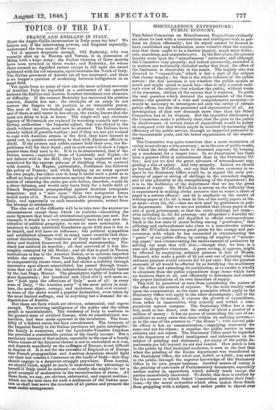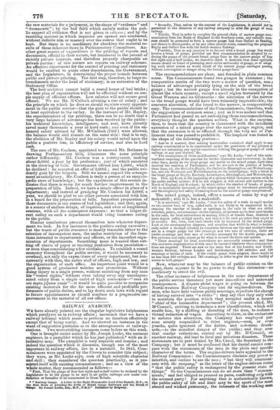MISCELLANEOUS EXPENDITURE: PUBLIC ECONOMY.
Tan Select Committee on Miscellaneous Expenditure evidently set about its task with a conscientious and intelligent wish to per- form its duties effectually ; but its report cannot be deemed to have established any information more valuable than the conclu- sion that there ought to be a further inquiry, much more delibe- rate, searching, and comprehensive. In the first place, the present inquiry arose upon the miscellaneous " estimates- and although the Committee very properly, and indeed necessarily, extended it to matters not technically included under that head, the effect of the limitation is observable in the result. The inquiry also was directed to " expenditure," which is but a part of the subject that claims inquiry ; for that is the whole conduct of the public service : the real question is not whether the public spends so much and might spend so much less—that is only a parish audi- tor's view of the subject—but whether the public, _without waste of its resources, obtains all the service that it requires. To settle the real question which dictated the appointment of the Com- mittee—the question of a wise and comprehensive economy—it would be necessary to investigate not only the outlay of certain public offices, but also the personnel and organization of all. An investigation of that sort demands more time than the Select Committee had at its disposal. But the imperfect disclosures of the Committee make it perfectly clear, that the gain to the public by disallowance of certain items of expenditure would be paltry as compared with that which might be attained by increasing the efficiency of the public service, through an improved personnel in the innumerable posts, and the better organization of the depart- ments.
The Committee was quite conscious that a mere restriction of outlay is not always a true economy ; as in the case of public works, of which the delay often leads to increased expense, by keeping up a machinery for a longer time. In no department has there been a greater effort at retrenchment than in the Stationery Of- fice; and yet we find the great advocate of retrenchment sug- gesting a rise of salary. And very properly. Indeed, we should go beyond Mr. M'Culloch, and say that the true economy in re- spect to the Stationery Office would be, to regard the mere par- simony of paper or saving of shillings in the secondary degree, and to aim primarily at the strengthening of the department; for it is in the feebleness of the department that we see the great sources of waste. Mr. M'Culloch is severe on the difficulty that is experienced in making clerks perceive that to waste a sheet of paper is a serious offence; and he is emphatic on the merits of writing-paper at Ils. 6d. a ream in lieu of the costly papers at 16s. or more—even 25s. 6d.—that are now used by gentlemen in pub- lic departments. But we are not satisfied that cheap paper is the end of good government, or that the extra shillings per ream— even including 3s. 6d. for pressing—are altogether a wasteful tri- bute to what is comely and dignified in official correspondence. Such is the low state of moral feeling among "gentlemen," that pilfering and embezzlement take place to a considerable extent; and Mr. M'Culloch deserves great praise for the energy and per- severance with which he has succeeded in circumventing the " osnts " of our public offices, by cutting off supplies of "mourn- ing paper," and circumventing the embezzlement of penknives by serving out none that will shut,—though that, we fear, is a ruse not altogether victorious. A great saving, it appears, might be effected by employing ordinary printers in lieu of Messrs. Hansard, who make a profit of 50 per cent out of printing which ordinary printers would execute for 10 per cent. But the greatest economy of all would be effected by so fortifying the machinery of the office and extending its jurisdiction, as to enable it wholly to eliminate from the public expenditure large items which have no business there at all, and efficiently to determine and control the proper limitations of its own functions of supply.
This will be perceived at once from considering the nature of the office and the sources of expense. We the more readily enter upon the examination, as thesame principles which apply to the Stationery Office will apply to the other departments ; and at the same time, by its nature, it exposes the growth of expenditure, from trifles to immensities, very nakedly and within a com- paratively narrow compass. The Stationery Office has a con- trol, more or less direct, over the outlay of about a quarter of a million of money : it has no power of controlling the rate of ex- penditure in many cases that come within its auditing powers,— as in the case of the printers to " the House "; with several pub- lic offices it has no communication,—supplying stationery for some and not for others; it supplies the public service in some colonies and not others. The Stationery Office must be regarded as the depository of official intelligence and information on the subject of printing and stationery ; yet many of the public de- partments are left beyond its aid and control. How much is lost to the public by that irrational exclusion, is seen in the fact that when the printing' of the Excise department was transferred to the Stationery Office, the rch,ole cost, 3,0001. or 4,0001., was saved to the public, through the superior knowledge of the Stationery Office in its own proper business. Another source of outlay is the printing of cart-loads of Parliamentary documents, especially useless matter in appendices, which nobody reads except the parties immediately interested. No doubt, this item is swelled by the lax manner in which Select Committees perform their func- tions,—by the moral cowardice which often makes them flinch from grappling with a subject, and rather prefer to shovel over
the raw materials for a judgment, in the shape of "evidence" and " documents" ; by the bad faith which unduly makes the pub- lic suspect all evidence that is not given in extenso ; and by the rambling manner in which inquiries are opened and conducted, without definite aim or mastery over the course that ought to be kept. But there is no machinery for checking the material re- sults of these inherent flaws in Parliamentary Committees. An- other great source of expenditure is the printing of reports and documents, official in their nature, but incidental to the pursuit of strictly private interests, and therefore properly chargeable on private parties : of this nature are reports on railway schemes. An effective department for the control of printing and stationery would be enabled to guide other departments, the Government, and the Legislature, in determining the proper bounds between public and private printing. The first step, therefore, to large re- trenchments under the head of stationery, is an extension of the Stationery Office. The best architect cannot build a sound house of bad bricks ; the best plan of organization will not be effectual without an am- ple supply of efficient officers. Low salaries will not secure good officers. We see Mr. McCulloch advising a rise of salary ; and the principle on which he does so should regulate every appoint- ment in the public service—that the gain to the public should be at least equivalent to the outlay. In the instance of Mr. Rapley, the superintendent of the printing, there can be no doubt that a very large balance of advantage has been received by the public : his technical knowledge, intelligence, and zeal, have directly saved many thousands a year in hard cash ; and even if the en- hanced salary advised by Mr. McCulloch (7501.) were allowed, the balance would still remain on the same side : that is to say, the abolition of Mr. Rapley and his salary would entail upon the public a positive loss, in efficiency of service, and also in hard cash.
The case of Mr. Coulson, appointed to succeed Mr. Bethune in drawing Parliamentary bills, illustrates the same principle rather differently. Mr. Coulson was a conveyancer, making about 3,0001. a year by his profession ; part of which consisted in the drawing of bills. Government offered him 1,5001., which he declined : he accepted an offer of 2,0001. ; and the public evi- .dently gain by the bargain. Still we cannot regard the arrange- ment as satisfactory. Mr. Coulson is truly a person of an encyclo- pedic store of knowledge ; but the experience of this session in- dicates that there is room for much further improvement in the preparation of bills. Indeed, we have a single officer in place of a department; and instead of grudging Mr. Coulson his 2,0001. a year, we should be glad to see other persons associated with him m a board for the preparation of bills. Imperfect preparation of those documents is one source of bad legislation ; and that, again, is a source of endless delays, of inquiries, and even of lengthened sessions, with all the consequent expenses : so that a larger di- rect outlay on such a department would bring immense saving to the public.
Similar conclusions present themselves into whatever depart- ment we look. In few instances is the positive outlay excessive ; but the waste of public resources is mostly traceable either to the selection of incompetent men, the undue restriction of the func- tions intrusted to departments and officers, or the imperfect orga- nization of departments. Something more is wanted than cut- ting off sheets of paper or rescuing penknives from peculation— or even than consolidating a few clerkships. To establish a sound economy throughout the public service, it would be necessary to overhaul, not only the expenditure of every department, but con- currently with that, the entire staff of officers, high and low, and the organization of each office. An important point would be a good system of graduated salaries and promotions. Without doing injury to a single person, without snatching from any man his "vested rights," without even taking away any uncompen- sated salary from a single cadet of high connexion—" ossa ab ore rapta jejunse canis "—it would be quite possible to reorganize existing materials for the far more efficient and profitable per- formance of public duties, and to lay down such laws with regard to future appointments as should conduce to a progressive im- provement in the material of all our offices.

























 Previous page
Previous page